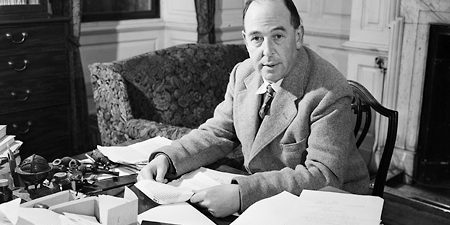
C. S. Lewis and Science
West, John, ed. The Magician’s Twin: C. S. Lewis on Science, Scientism, and Society. Seattle: Discovery Institute Press, 2012.
Review by Richard Weikart—
Did C. S. Lewis believe in evolution or was he a skeptic of Darwinism? Was Lewis anti-scientific, as some of his contemporaries alleged? Why was Lewis so disturbed by the threat of technocracy? Does Lewis have anything to say to us today about the role of science in ethics and politics? The Magician’s Twin provides answers to these and many other important questions.
If you are a C. S. Lewis aficionado, or if you have never even heard about Lewis (which is not likely), The Magician’s Twin will open your eyes to some of the most important issues facing our society today. Lewis’s writings were remarkably prescient, and most of the cultural and intellectual ills he diagnosed are still afflicting the body politic. A colleague of mine with two doctorates—one in medicine and another in history—told me recently in reference to bioethics that she thinks we have reverted back to the mentality of the 1930s. This makes Lewis all the more relevant to contemporary discussions about science and ethics.
The uniformly top-notch essays that John West has collected deliver a lot more than the title suggests. The first five essays analyze Lewis’s general view of science and scientism. Scientism is the view that science is the only means to real knowledge and thus should guide our society’s ethical and political decisions. While Lewis accepted the legitimacy of the scientific enterprise, he decisively rejected scientism’s intellectual imperialism. He warned us to beware when those wearing labcoats begin to pontificate about subjects beyond their ken.
Two cogent essays by John West explore Lewis’s views on Darwinism. West lays to rest the myth that Lewis was a gung-ho theistic evolutionist. He admits that Lewis often accepted the plausibility of some kind of common descent. However, later in life he became more skeptical about any form of evolution, though he never wrote extensively about it. Two of the most interesting findings by West are: 1) that Lewis was skeptical of Darwinism before he even converted to Christianity; and 2) that Lewis consistently rejected one major feature of Darwinian evolution: its insistence on random, non-teleological processes. Even when he accepted the possibility of common ancestry, he always rejected the notion that the process could have been random. West argues that Lewis’s position is thus much closer to Intelligent Design than to Darwinism.
Two further essays by Jay Richards and Victor Reppert explain Lewis’s argument from reason, which was an argument against philosophical materialism. In brief form, the argument claims that materialism is self-refuting, because is explains all beliefs as the products of material causation, which is a non-rational cause. This undermines their own belief in materialism, because a position cannot be upheld rationally if it arises exclusively from non-rational causes. Materialism is caught in a contradictory position. (The renowned Christian philosopher Al Plantiga has more recently developed a refined form of this argument).
I found the final section on “Society” the most fascinating, but perhaps this is because I’m working on a book project that intersects with Lewis’s Abolition of Man, which plays a central role in this section (my project is tentatively entitled, The Death of Humanity: Are You a Cosmic Accident?). The opening essay by James Herrick applies Lewis’s insights to today’s transhumanist movement, which aspires to help humans evolve to higher levels. Lewis’s critique of the reduction of humans to material objects is still a powerful blast to such genetic tinkering. Further, Lewis pointed out that by manipulating human nature, technocrats are reducing future humans to the objects of their experimentation. An erudite essay by M. D. Aeschliman reinforces Herrick’s conclusions by explaining the significance of Abolition of Man in combating the dehumanizing tendencies in Lewis’s time and in ours.
There is much more in this book, and I regret that I could not mention all the authors and their outstanding essays. Anyone with any interest in Christian apologetics, or in the Intelligent Design debate, or in the role of science in our society, or bioethics, would do well to consult this insightful anthology.
Richard Weikart is professor of history at California State Univ., Stanislaus, and author of From Darwin to Hitler: Evolutionary Ethics, Eugenics, and Racism in Germany.

